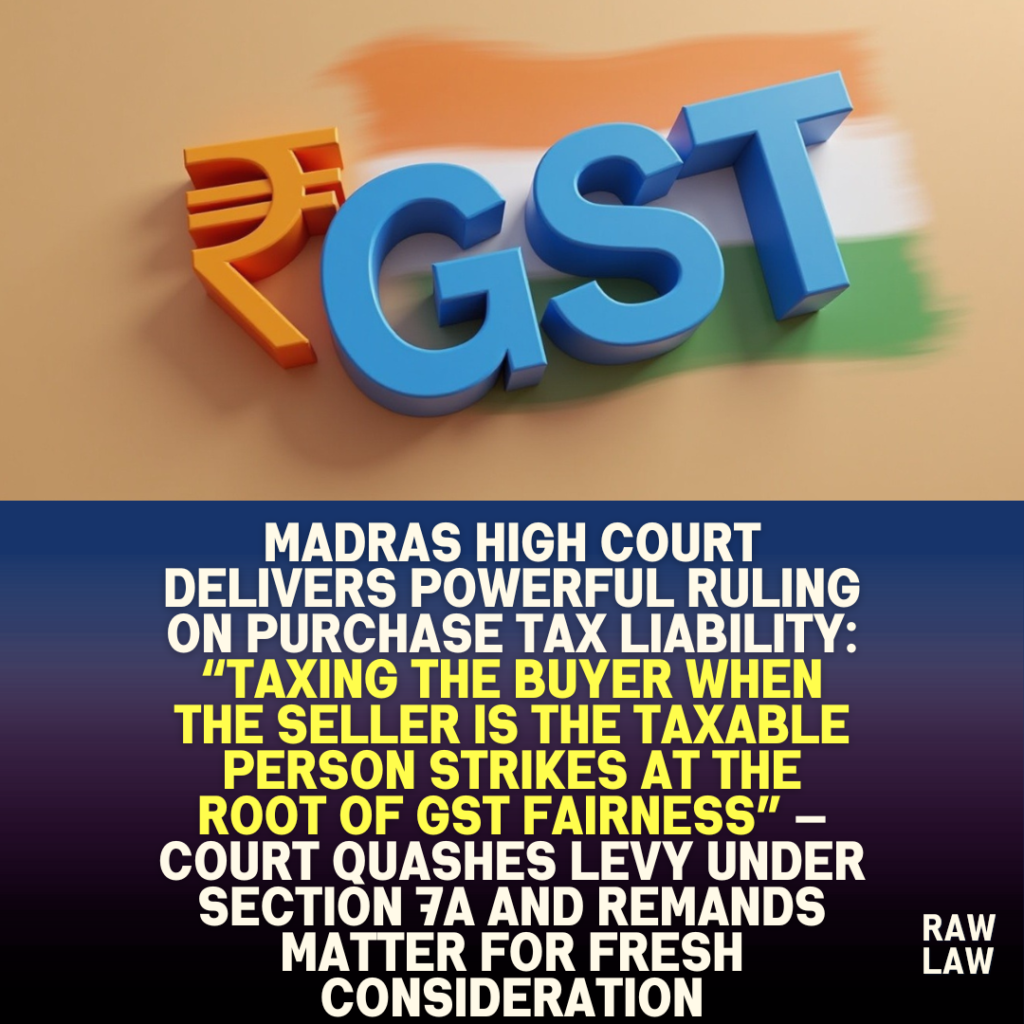Court’s decision
The Madras High Court set aside the assessment order imposing purchase tax under Section 7A of the Tamil Nadu Value Added Tax Act (TNVAT), holding that the authority had failed to examine whether the seller was already liable to tax on the disputed transactions. The Court observed that “Section 7A cannot be invoked in a mechanical manner to shift the tax burden on the buyer when statutory liability rests on the seller.” It remanded the matter for fresh enquiry and directed the assessing authority to verify all relevant documents, including the seller’s registration status, returns and turnover. The Court emphasised that fair assessment demands a reasoned analysis rather than assumptions.
Facts
The petitioner, a registered dealer engaged in roofing sheet manufacturing, purchased inputs such as iron and steel from local suppliers. The assessing officer, upon scrutiny of accounts, concluded that certain purchases were made from unregistered dealers or from dealers who did not report sales, and therefore imposed purchase tax under Section 7A. The petitioner produced invoices and payment details and claimed that the sellers were registered and that the goods formed part of the manufacturing process. The authority nonetheless passed a reassessment order, leading to the present challenge.
Issues
The Madras High Court examined several critical issues:
- Whether Section 7A can be invoked without proving that the seller failed to pay output tax.
- Whether the assessing authority considered the petitioner’s documentary evidence.
- Whether the order was non-speaking and without application of mind.
- Whether purchase tax liability arises merely because sellers did not file returns.
- Whether principles of natural justice were followed before imposing purchase tax.
Petitioner’s arguments
The petitioner argued that the assessment was fundamentally flawed because it presumed non-payment of tax by sellers without verifying their registration status or turnover declarations. The petitioner contended that purchase tax under Section 7A applies only when the seller is not liable to pay tax, which was not the case here. The petitioner claimed that all purchases were supported by invoices, delivery challans, and bank payments and that the authority failed to examine the sellers’ returns or cross-verify data from the departmental system. They further asserted that the impugned order lacked reasons, violated natural justice, and ignored Supreme Court and High Court precedents mandating strict interpretation of charging provisions.
Respondent’s arguments
The Department argued that during reassessment proceedings, certain discrepancies surfaced indicating that the sellers had not disclosed the sales. It claimed that the petitioner did not produce satisfactory evidence to prove that the transactions were genuine and that Section 7A was correctly invoked to safeguard revenue. The authorities submitted that non-appearance of the sellers and non-reflection of transactions in their returns justified the levy of purchase tax. They maintained that the assessment was made after granting adequate opportunity.
Analysis of the law
The Madras High Court undertook a detailed analysis of Section 7A, which functions as a reverse-charge mechanism under the TNVAT regime, but only in specific circumstances. The Court noted that the foundation of Section 7A lies in proving that the seller is not liable to tax, and until that condition is established, purchase tax cannot be imposed. The Court reiterated that a charging provision must be strictly construed and cannot be applied based on presumptions. It emphasised that non-reflection of transactions by sellers cannot automatically lead to Section 7A liability on the purchaser unless proper enquiry demonstrates that the taxable event truly shifts to the buyer. The Court also stressed the need for a “speaking order” containing proper reasons.
Precedent analysis
The Court referred to the Supreme Court’s ruling in State of Tamil Nadu v. Kandaswami, which laid down the scope of purchase tax and held that the levy applies only when the seller is exempt, unregistered, or otherwise not liable. The Court also considered the Kerala High Court’s ruling in Kerala Premo Pipe, where it was held that assumption-based purchase tax assessments are invalid. Madras High Court precedent such as Sri Vinayaga Agencies was cited to reiterate that tax authorities must record specific findings on liability before imposing purchase tax. These rulings supported the conclusion that the impugned assessment suffered from legal infirmities.
Court’s reasoning
The Madras High Court found that the assessment order did not contain any analysis of the seller’s registration status, turnover, or tax liability, nor did it record any reasons explaining the invocation of Section 7A. The authority merely noted that the sellers failed to declare the sales in their returns and concluded that purchase tax was automatically attracted. The Court held that such reasoning was contrary to binding precedents and constituted non-application of mind. The Court stressed that fair assessment requires verification of seller returns, departmental records, and all documents provided by the petitioner. Since this was not done, the assessment lacked legal foundation.
Conclusion
The Madras High Court quashed the impugned assessment order and remanded the matter to the authority for fresh consideration. It directed the assessing officer to examine:
– Seller registration details
– Seller turnover and tax returns
– Departmental database records
– Supporting documents produced by the petitioner
The Court instructed that a reasoned, speaking order be passed after granting the petitioner an opportunity of personal hearing. Until then, coercive recovery shall remain stayed.
Implications
This judgment significantly strengthens taxpayer protections in purchase tax assessments. It establishes that authorities cannot mechanically invoke Section 7A without conducting factual enquiry or verifying the seller’s liability. It also reinforces that pattas, invoices, and departmental data must be evaluated objectively. The ruling promotes fiscal certainty, prevents arbitrary reverse-charge taxation, and ensures that buyers are not burdened merely because sellers fail to file returns. The judgment will influence future cases involving purchase tax and reverse-charge assessments under both TNVAT and similar frameworks.



